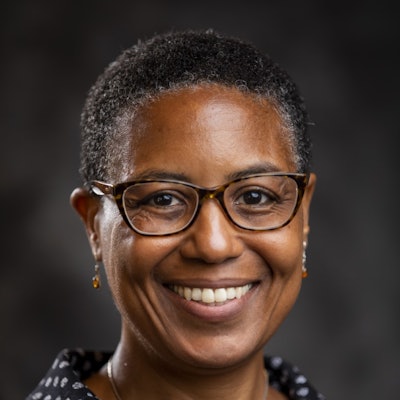When Cashawn Thompson coined the hashtag #BlackGirlMagic in 2013, she lovingly acknowledged the beauty, labor, daring, and complexity of Black girls and women. Over the last decade, Thompson’s resonant affirmation has invigorated ways of embracing the full humanity of these girls and women, including their joys and aspirations. Like the burgeoning field of Black Girlhood Studies, the hashtag invites them to “widen the field of possibility for ourselves and others.” And though it would be several more decades until the creation of the hashtag, Mrs. Edith Renfrow Smith was doing just that, widening the field of possibility when she became the first Black woman graduate of Grinnell College in 1937.
While the term #BlackGirlMagic is contemporary, its concept is a historical phenomenon traceable over the last century. In 1905, Black feminist civic leader and educator Fannie Barrier Williams (1855-1944), penned an essay titled, ‘The Colored Girl.’ A member of the New Negro Womanhood movement, Barrier Williams saw possibility in an age-inclusive Black girlhood. As she provided examples of Black girls and women “pluckily challenging this humiliating color line,” she celebrated their “impertinence” and how they remained “conscious of their own deserving.” Similarly attuned to intrinsic Black girl value, Nannie Helen Burroughs (1883-1961) founded The National Training School for Women and Girls [NTS] in Washington, DC. Guided by the motto “Work. Support thyself. To thine own powers appeal,” the NTS operated from 1909-1961 and complemented its vocational curriculum with mandatory courses in Black history and the liberal arts. Focused on educating working-class Black women to become skilled, self-employed service professionals, Burroughs and her college-educated faculty “resolved to find and train leaders.” And from 1922-1937, Dean Lucy Diggs Slowebrought a “blueprint” of #BlackGirlMagic to Howard University. By cultivating their excellence through joy and centeredness, she inspired Black college women to “live more abundantly” and lean into their self-actualization and social usefulness. Dr. Tamara Beauboeuf-Lafontant,
Dr. Tamara Beauboeuf-Lafontant,
The 108-year old Mrs. Renfrow Smith embodies a century of #BlackGirlMagic. When asked whether she was “actively recruited” to Grinnell College, she decisively responds, “They didn’t recruit me at all. I recruited myself.” Such self-possession has consistently characterized Mrs. Renfrow Smith. The granddaughter of enslaved persons, Edith Renfrow Smith was born in the town of Grinnell, IA, on July 14, 1914, two weeks before the outbreak of WW1. She is the fifth of six children—all of whom earned their college degrees—and to hear Mrs. Renfrow Smith tell her life story is to quickly learn that her experience of #BlackGirlMagic emanates from her mother, Eva Pearl Craig Renfrow (1875-1962).
Mrs. Renfrow Smith navigated her rural Iowa hometown without losing sight of herself or her ambition because of her mother’s daily affirmation. She recalls her mother saying, “I don’t’ care who it is. There is no one born any better than you. They may have more money and they may be more beautiful. They may have outward things. But there’s no one any better.”
These words profoundly impacted the youngest Renfrow daughter. “So naturally if you’re taught there’s no one any better than you are, why you think you’re pretty special. And so, I think that that made a great difference.”
Mrs. Renfrow Smith’s sense of inherent significance also emanates from knowing her family history. As the elder recalls her girlhood, “I sat on her lap all day. ‘Mama, tell me a story. Mama, tell me a story.’ And she would just sit there in the evening and tell me all these [stories], nobody else listening to her…. And my mother was a great storyteller…. She could quote Paul Laurence Dunbar and speak that dialect. It was beautiful!.... And she had a lot of information about her father’s family and her mother’s family that she told us.”
Her mother’s oral histories stretched back to the mid-19th century and ranged over three significant branches of their extended family tree. As a result, Mrs. Renfrow Smith learned that before the Civil War, freedom-seeking forebears came to Iowa to build their lives. And over her own life, she has kept the chronology current. This collective history shapes her self-perception as the proud descendent of “a bunch of fighters.”
When Mrs. Renfrow Smith entered Grinnell College in 1933, she was not focused on making institutional history. She attended because it was a dream she wanted to pursue for herself. However, I believe knowing her value and specialness also anchored her persistence as the sole African American student during her four undergraduate years.
After earning her bachelor's degree in 1937, Mrs. Renfrow Smith moved to Chicago. She became a master teacher and taught sixth grade in the Chicago Public Schools for almost a quarter century. After retiring in 1976, she launched a 40-year volunteering career, her sustained contributions earning her induction into the Chicago Senior Citizens Hall of Fame. With her extraordinary memory and spry demeanor, she is a featured member of Northwestern University’s SuperAging Study. In her second century of living, she still embodies her mother’s motto and centers activities that have long brought her joy—baking, canning, reading, keeping up with friends, writing notes, and sharing her family’s stories.
Mrs. Renfrow Smith is the namesake of the newest residence hall of her alma mater. She deems this recognition “special for not only me but all the people who will come after me. But that's the important thing. That they'll learn about a person who started small and came out big.” In the person of Mrs. Renfrow Smith, I see evidence of a century of #BlackGirlMagic, of Black women encouraging each other’s spirits and nurturing their dreams into change-making realities.
Dr. Tamara Beauboeuf-Lafontant, the Louise R. Noun Chair in Gender, Women's, and Sexuality Studies at Grinnell College, has conducted several life history interviews with Mrs. Renfrow Smith and is working on a project that views the alumna’s pioneering as an early form of what we now call #Black Girl Magic.
--















